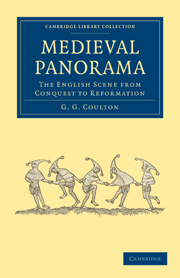Book contents
- Frontmatter
- Contents
- Illustrations
- Preface
- Introduction
- Chapter 1 The Cauldron of God's Wrath
- Chapter 2 Bishops of Rome
- Chapter 3 Conversion of the Wild Men
- Chapter 4 Feudalism emerges
- Chapter 5 Land and Folk
- Chapter 6 The Village (1)
- Chapter 7 The Village (2)
- Chapter 8 Village Dance and Song
- Chapter 9 Nature and Superstition
- Chapter 10 Popes and Prelates
- Chapter 11 Rector and Vicar
- Chapter 12 The Making of a Priest
- Chapter 13 Church statistics
- Chapter 14 The Shepherd
- Chapter 15 The Flock (1)
- Chapter 16 The Flock (2)
- Chapter 17 The Silver Lining
- Chapter 18 Dante's Commedia
- Chapter 19 The Royal Court
- Chapter 20 Chivalry
- Chapter 21 Chaucer and Malory
- Chapter 22 The Monastery
- Chapter 23 Cloister Life
- Chapter 24 The Town
- Chapter 25 Home Life
- Chapter 26 Trade and Travel
- Chapter 27 Just Price and Usury
- Chapter 28 The Ghetto (1)
- Chapter 29 The Ghetto (2)
- Chapter 30 Justice and Police
- Chapter 31 From School to University
- Chapter 32 Scholastics and Bible
- Chapter 33 Science
- Chapter 34 Medicine
- Chapter 35 Freethought and Inquisition
- Chapter 36 The Papal Schism
- Chapter 37 The Lollards
- Chapter 38 The Black Death
- Chapter 39 The Hundred Years' War
- Chapter 40 The Mystics
- Chapter 41 The Peasant Saint
- Chapter 42 Artist Life
- Chapter 43 Literary Life
- Chapter 44 Sports and Theatre
- Chapter 45 Women's Life
- Chapter 46 Marriage and Divorce
- Chapter 47 The Old and the New
- Chapter 48 More and Utopia
- Chapter 49 The Fight for the Bible
- Chapter 50 The Open Bible
- Chapter 51 Peasant and Highbrow
- Chapter 52 The Bursting of the Dykes
- Notes
- Index
- Plate section
Chapter 17 - The Silver Lining
Published online by Cambridge University Press: 05 July 2011
- Frontmatter
- Contents
- Illustrations
- Preface
- Introduction
- Chapter 1 The Cauldron of God's Wrath
- Chapter 2 Bishops of Rome
- Chapter 3 Conversion of the Wild Men
- Chapter 4 Feudalism emerges
- Chapter 5 Land and Folk
- Chapter 6 The Village (1)
- Chapter 7 The Village (2)
- Chapter 8 Village Dance and Song
- Chapter 9 Nature and Superstition
- Chapter 10 Popes and Prelates
- Chapter 11 Rector and Vicar
- Chapter 12 The Making of a Priest
- Chapter 13 Church statistics
- Chapter 14 The Shepherd
- Chapter 15 The Flock (1)
- Chapter 16 The Flock (2)
- Chapter 17 The Silver Lining
- Chapter 18 Dante's Commedia
- Chapter 19 The Royal Court
- Chapter 20 Chivalry
- Chapter 21 Chaucer and Malory
- Chapter 22 The Monastery
- Chapter 23 Cloister Life
- Chapter 24 The Town
- Chapter 25 Home Life
- Chapter 26 Trade and Travel
- Chapter 27 Just Price and Usury
- Chapter 28 The Ghetto (1)
- Chapter 29 The Ghetto (2)
- Chapter 30 Justice and Police
- Chapter 31 From School to University
- Chapter 32 Scholastics and Bible
- Chapter 33 Science
- Chapter 34 Medicine
- Chapter 35 Freethought and Inquisition
- Chapter 36 The Papal Schism
- Chapter 37 The Lollards
- Chapter 38 The Black Death
- Chapter 39 The Hundred Years' War
- Chapter 40 The Mystics
- Chapter 41 The Peasant Saint
- Chapter 42 Artist Life
- Chapter 43 Literary Life
- Chapter 44 Sports and Theatre
- Chapter 45 Women's Life
- Chapter 46 Marriage and Divorce
- Chapter 47 The Old and the New
- Chapter 48 More and Utopia
- Chapter 49 The Fight for the Bible
- Chapter 50 The Open Bible
- Chapter 51 Peasant and Highbrow
- Chapter 52 The Bursting of the Dykes
- Notes
- Index
- Plate section
Summary
Let us turn now to the other side of the ledger. With all these undeniable failings, I cannot doubt that the Church was, on the whole, a power working for good, and that she would have been far the greatest of then existent powers for good, if only she had been able to work in harmony with other religious, moral, and intellectual movements, instead of threatening and even employing fire and sword against them.
Even the priest's unpopularity had its other side, illogical perhaps but most natural psychologically. The man who hated his parson most might well be he who most deeply felt, and shrank from, his supernatural powers. A modern French-Canadian, in a penetrating study of the Church there, quotes the words of a peasant farmer from whom the priest had turned haughtily away in the course of a heated dispute about tithes. “I longed to plant him a hearty kick on the part which he exposed to me; but then I thought my leg might shrivel up!” For many centuries the feudal lord had been tolerated, and even in a sense welcomed, as a protection against worse evils; and the priest, even at his worst, wielded the most effectual weapons against the Devil. He might damn his own soul every day that he touched the Lord's Body with sinful hands; but his Mass was none the less an opus operatum. One of the Gesta Romanorum tales was composed expressly to illustrate this doctrine.
- Type
- Chapter
- Information
- Medieval PanoramaThe English Scene from Conquest to Reformation, pp. 197 - 206Publisher: Cambridge University PressPrint publication year: 2010First published in: 1938



